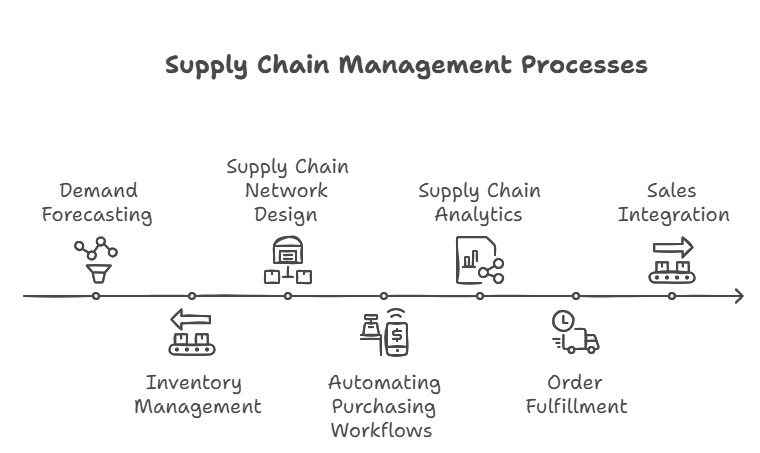Engineering Resilient
Global Supply Chains
Current Focus: MITx MicroMasters® in SCM
This portfolio showcases my expertise in designing, optimizing, and managing complex global supply chains through data-driven strategies and advanced ERP solutions. My expertise is built on a foundation of intensive training in Oracle ERP and is now being advanced through the prestigious MITx MicroMasters® program.

Program Progress
- CTL.SC0x – Supply Chain Analytics (Completed)
- CTL.SC1x – Supply Chain Fundamentals (In Progress)
- CTL.SC2x – Supply Chain Design
- CTL.SC3x – Supply Chain Dynamics
- CTL.SC4x – Supply Chain Technology and Systems
- Comprehensive Final Exam
Core Topics in Completed Course (CTL.SC0x)
This foundational course covered probability, descriptive statistics, regression, constrained/unconstrained optimization, simulation, and basic data management for supply-chain modeling.
Foundational Training: Digital Egypt Pioneers Initiative
The Digital Egypt Pioneers Initiative (DEPI) by MCIT provided the 9-month intensive scholarship that launched my specialization in Supply Chain and Oracle ERP, bridging academic learning with industry needs and preparing a new generation of leaders for Egypt's digital future.

DEPI Program Completion
Certificates recognizing the successful completion of the intensive Digital Egypt Pioneers Initiative program, which provided foundational expertise in SCM and Oracle ERP.

Oracle Digital SCM Certificate
Represents the core technical achievement in Oracle Digital Supply Chain Management from the government-backed DEPI program.

Business English Certificate
Certifies completion of the complementary Business English track, delivered by Berlitz, enhancing professional communication skills.
Technical Mastery: Oracle ERP & Advanced SCM Concepts
Through extensive hands-on practice and in-depth theoretical study, I developed a robust command of Oracle ERP functionalities and critical Supply Chain Management principles, preparing me for data-driven operational excellence.
Oracle ERP Modules: Configuration & Strategic Application

Inventory Module: Mastering Stock & Asset Control
Comprehensive skills in defining, configuring, and managing inventory within Oracle ERP to ensure accurate stock levels and efficient asset control.
Purchasing Module: Streamlining Procure-to-Pay
Expertise in managing the entire procure-to-pay lifecycle within Oracle ERP, from requisitioning to supplier management and automated purchasing workflows.
Order Management Module: Optimizing Order-to-Cash
Proficiency in configuring and managing Oracle ERP's order management functionalities to optimize the entire order-to-cash process.
Key Supply Chain Management Concepts & Strategic Application
A deep understanding of core SCM principles and their strategic application to optimize end-to-end supply chain performance.

Capstone Project: Golden Cart
Oracle ERP for Hypermarket Transformation
"Golden Cart" was the culmination of my DEPI training, a comprehensive Oracle ERP implementation project designed to revolutionize a hypermarket chain's operations by applying learned SCM and ERP principles to address real-world retail challenges.

Project Story: From Problem to Solution
The Challenge: Retail Pain Points
We addressed critical challenges hindering efficiency: inaccurate inventory, complex manual procurement, fragmented sales data, and the high cost of inaction in a competitive digital market.
The Solution: Oracle EBS as the Digital Core
Our strategy was to implement Oracle E-Business Suite as a robust digital core to achieve **Scalability, Integration, Reliability, Efficiency, and Growth.**
Implementation Highlights
Foundational Setup & Inventory
- Multi-Organizational Structure
- Centralized Item Master with Templates
- Lot & Serial Control for Traceability
- Min-Max Planning for Replenishment
Procurement & Order Management
- Centralized Supplier Repository
- Configurable Approval Workflows
- Custom Sales Order & Line Types
- Complex Price List Management
Innovative Impact: Automating for Profitability
Our most innovative solution was an automated demand-supply workflow using Min-Max planning, which **eliminated 90% of human interaction** in replenishment. We also maximized profitability by strategically using Average Costing to smooth price variations and ensure accurate inventory valuation.
Project Documentation
Soft Skills Growth & Professional Development
The DEPI program's holistic approach extended beyond technical training, fostering a robust set of soft skills crucial for effective leadership, collaboration, and career advancement.
Key Soft Skills Acquired & Enhanced
Career Planning
Personality Types
Personal Branding
Emotional Intelligence
CV & Interview Skills
Presentation Skills
Employment Coaching
Communication Skills